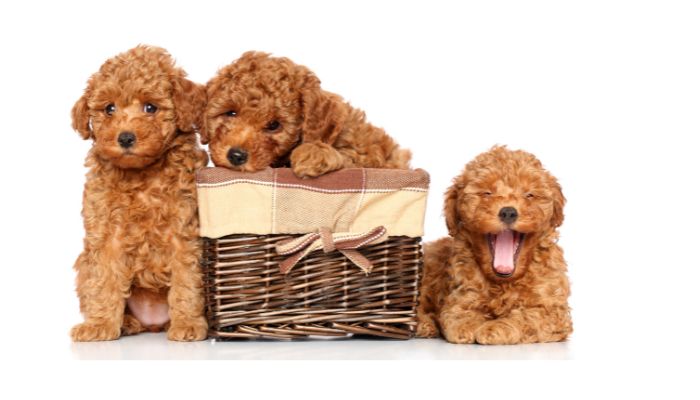Toy poodles, like all dogs, are pregnant for about 63 days, or about 9 weeks. However, it is important to note that every dog is different, and the length of pregnancy can vary slightly from one individual to another. It is also important to remember that it is not always easy to determine exactly when a dog is pregnant, as the early signs of pregnancy can be subtle. If you suspect that your toy poodle is pregnant, it is important to have her evaluated by a veterinarian to confirm the pregnancy and to discuss any necessary care and management during the pregnancy.

How old does a toy poodle have to be to get pregnant?
Toy poodles, like all dogs, reach sexual maturity at different ages depending on their size, breed, and individual factors. For toy poodles, sexual maturity is typically reached at about 6 to 9 months of age. However, it is generally recommended to wait until a toy poodle is at least 1 to 1.5 years old before breeding, as younger dogs may not be physically mature enough to handle the demands of pregnancy and childbirth.
It is important to note that breeding a toy poodle before she is fully physically mature can increase the risk of complications during pregnancy and childbirth.
It is also important to carefully consider the physical and emotional demands of breeding and raising a litter of puppies before deciding to breed your toy poodle.
If you are considering breeding your toy poodle, it is a good idea to discuss your plans with a veterinarian and to carefully research the responsibilities and potential risks involved.
How many puppies does a toy poodle have?
The number of puppies that a toy poodle has in a litter can vary widely. Toy poodles are generally small dogs, and they may have anywhere from 1 to 6 puppies in a litter, although litters of 3 to 4 puppies are most common. The size of the litter can depend on a variety of factors, including the age and health of the mother, as well as genetic factors.
It is important to note that the size of a toy poodle’s litter can have an impact on the health and well-being of both the mother and the puppies. Smaller litters may be easier for the mother to care for and may have a higher survival rate, while larger litters can increase the risk of complications and may be more difficult for the mother to care for. If you are considering breeding your toy poodle, it is a good idea to discuss the potential size of the litter with a veterinarian and to be prepared to provide extra care and support as needed.
Related: The number of puppies standard poodle have?
How can I tell if my toy poodle is pregnant?
There are a few signs that may indicate that your toy poodle is pregnant, although it is not always easy to determine if a dog is pregnant in the early stages. Some common signs of pregnancy in dogs include:
Changes in behavior: Pregnant dogs may become more affectionate or clingy, or they may seem more aloof or distant.
Changes in appetite: Pregnant dogs may have a decreased or increased appetite, or they may seem more picky about their food.
Changes in appearance: As the pregnancy progresses, the abdomen may become larger and more rounded, and the nipples may become larger and darker.
Changes in body temperature: A dog’s body temperature may drop slightly just before she gives birth.
Other physical changes: Some dogs may experience morning sickness, lethargy, or changes in the amount or consistency of their vaginal discharge during pregnancy.
If you suspect that your toy poodle is pregnant, it is important to have her evaluated by a veterinarian to confirm the pregnancy and to discuss any necessary care and management during the pregnancy. A veterinarian can also perform tests to determine if your dog is pregnant, such as a blood test or an ultrasound.

